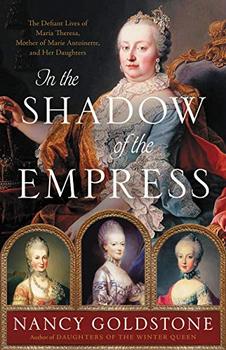Summary | Excerpt | Reading Guide | Reviews | Beyond the Book | Readalikes | Genres & Themes | Author Bio

The Defiant Lives of Maria Theresa, Mother of Marie Antoinette, and Her Daughters
by Nancy Goldstone12
The Little One
You are the luckiest of all your sisters and of all princesses.
Marie Antoinette was born on November 2, 1755. Just a year earlier, an overeager American colonial had exceeded his orders and opened fire on a sleeping French reconnaissance unit, rekindling hostilities between England and France. The crisis had driven Maria Theresa into a treaty with Louis XV, arranged surreptitiously through Madame de Pompadour. Thus, it could be argued that, since both her youngest daughter and the Austrian-French alliance came into being at more or less the same moment in history, it was George Washington who put Marie Antoinette on the throne of France.
Toinette, as she was nicknamed (although she was also often referred to simply as "the little one"), was her mother's fifteenth child and youngest daughter. She was exceptionally pretty, all big blue eyes, blond curls, and merry disposition, not unlike Maria Theresa herself as a young girl. Marie Antoinette was her father's favorite: Francis loved the sweet smiles and adorable prattle of this last baby girl, and indulged her affectionately. Of all his children, she most resembled him, not so much in looks as in nature — she was highly social and at her best in company (and, like him, somewhat less successful in the schoolroom). There is a charming account of a gathering at Schönbrunn on October 13, 1762, just three weeks before Marie Antoinette's seventh birthday, when a pint-sized musical prodigy by the name of Wolfgang Amadeus Mozart was invited to entertain the imperial family. As the visiting musician was himself just six years old, all of Maria Theresa's children, even those in the younger group, were allowed to attend the performance. Mozart immediately won the heart of the empress by leaping onto her lap and giving her a kiss. Francis was similarly captivated, calling the boy "the little sorcerer" when he responded to a teasing dare of the emperor's by effortlessly playing the harpsichord with all the keys covered. But it was Marie Antoinette who made the most vivid impression on the small savant who would grow up to become one of the most brilliant composers in history. Unused to the polished floors of the palace, at one point during his audience (which lasted three hours), Mozart slipped and fell. Before he could right himself, winsome little Marie Antoinette ran to him and picked him up. "You are good," he exclaimed with a mixture of gratitude and obvious admiration. "I shall marry you!"
She was too young to know it, but this lighthearted encounter
was one of her mother's few intervals of levity that fateful year. At the same time that the diminutive Mozart was enthralling Marie Antoinette and her family with his musical parlor tricks, Frederick the Great, having been saved from a crushing defeat by the fortuitous death of Empress Elizabeth, was busy retaking Silesia and Dresden, and a shattered Maria Theresa understood that the war into which she had poured all her hopes, and the horrors of which she had inflicted on her loyal subjects for the past six years, was irretrievably lost. Small wonder, then, that the emperor and empress sought to divert themselves with children whose innocent antics made for such a refreshing contrast to the cares of adult life. It was soon after the Mozart recital that Maria Christina painted the portrait of her parents at the holiday breakfast table, and there is seven-year-old Marie Antoinette, proudly holding up her new doll, significantly the only younger daughter present, secure in her position as treasured pet of the family.
This she remained through the heartache of the next few years, which included the loss of first her sister Maria Johanna, nearly twelve to Marie Antoinette's seven, and then her brother Joseph's first wife, Isabella, both to smallpox, when she was eight. In those dark days, Marie Antoinette's ready laugh, bright little face, and affectionate demeanor gladdened her parents' hearts. She was a darling, uncomplicated child, existing entirely on the surface, and these qualities were rewarded with adult approval.
Excerpted from In the Shadow of the Empress by Nancy Goldstone . Copyright © 2021 by Nancy Goldstone . Excerpted by permission of Little Brown & Company. All rights reserved. No part of this excerpt may be reproduced or reprinted without permission in writing from the publisher.
Your guide toexceptional books
BookBrowse seeks out and recommends the best in contemporary fiction and nonfiction—books that not only engage and entertain but also deepen our understanding of ourselves and the world around us.